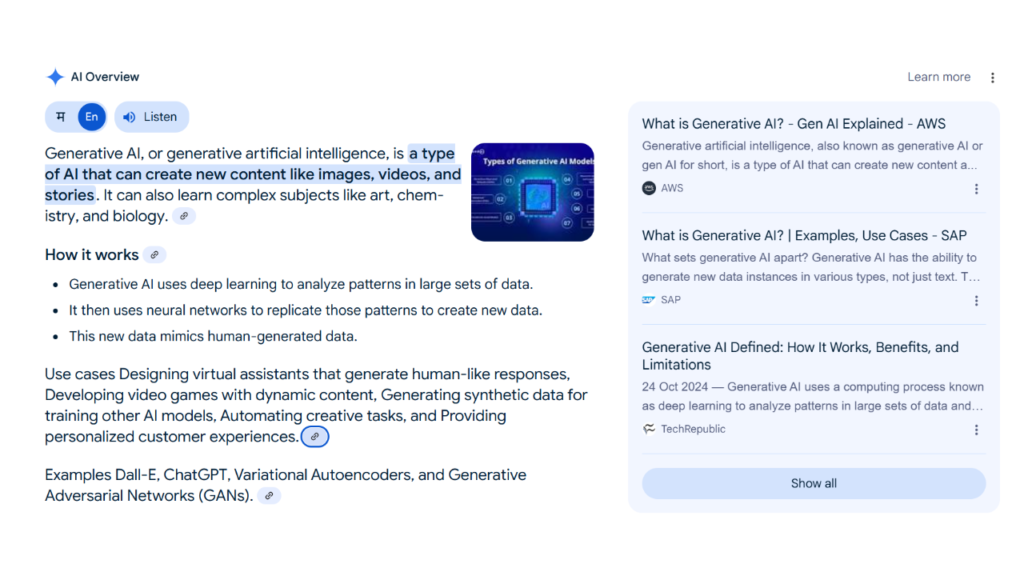AI in Marketing: How Generative AI is Reshaping Website Traffic
Table of Contents
Introduction
Generative Engine Optimization (GEO) is a strategy focused on optimizing content for AI-powered search engines like Google’s Search Generative Experience (SGE). Traditionally, SERPs (Search Engine Result Pages) have been structured with ads at the top, followed by snippets, organic results, and additional ads. However, with GEO, a large generative AI box will appear at the top of the page, providing AI-generated answers before anything else. This fundamental shift pushes traditional search results further down, reducing organic traffic for websites and making it crucial for brands to optimize content for AI-driven responses.
How is GEO Changing Search Behavior?

AI-generated search experiences are reshaping user behavior by providing instant, AI-curated responses without requiring users to click on websites. Instead of browsing through multiple pages, users get comprehensive answers directly within the AI-generated search snippet. This shift has significant implications, including:
- Reduced Organic Clicks: Websites that previously relied on SEO to rank high in search results may see a decline in traffic as AI-generated responses dominate the top of the page.
- Content Fragmentation: AI summarizes content, meaning users might not need to visit the original source for detailed information.
- Higher Competition for Visibility: Brands will need to optimize content specifically for AI-driven search algorithms rather than just traditional SEO techniques.
The Key Elements of Generative Engine Optimization
To remain competitive, marketers and content creators must adapt their strategies. Here are key components of Generative Engine Optimization:
Conversational & Contextual Optimization
AI-generated results favor conversational, well-structured, and highly relevant content. To rank in AI-driven search results, brands should:
- Use natural language processing (NLP)-friendly content.
- Answer common user queries concisely and accurately.
- Create structured and factual responses that AI can easily summarize.
Focus on Authority & Trustworthiness
AI engines prioritize content from authoritative and highly trusted sources. To establish credibility:
- Improve E-A-T (Experience, Expertise, Authoritativeness, and Trustworthiness).
- Publish fact-based, well-cited content.
- Ensure transparency by linking sources and credentials.
Enhancing Content for AI Summarization
With AI summarizing large amounts of content, websites should:
- Use structured data (schema markup) to help AI understand content context.
- Create concise headings and bullet points for quick summarization.
- Optimize for featured snippets, as these are commonly pulled into AI-generated responses.
Leveraging AI for Content Creation
Since AI-driven search rewards content clarity and relevance, brands should use AI-powered tools to:
- Generate data-driven insights for content creation.
- Create hyper-personalized experiences.
- Optimize for voice search and multimodal search (text, image, and video integration).
The Future of Website Traffic: Will GEO Kill Organic Search?
As Generative AI evolves, the traditional reliance on organic traffic from search engines will continue to decline. However, this does not mean SEO is obsolete. Instead, brands will need to:
- Adapt to new ranking factors driven by AI.
- Focus on creating high-value, authoritative content that AI search tools recognize.
- Develop alternative traffic sources, such as social media, direct engagement, and email marketing.
The Role of AI-Powered Assistants in GEO
Another significant factor in the rise of Generative Engine Optimization (GEO) is the increasing reliance on AI-powered assistants like ChatGPT, Google Bard, and Microsoft’s Copilot. These AI tools provide users with direct answers to queries without requiring them to visit external websites. As a result, businesses must optimize their content to align with AI-driven responses, ensuring their brand information is included in AI-generated summaries. By structuring content with clear, well-researched, and authoritative information, brands can improve their chances of being referenced by AI search engines, increasing brand visibility even as traditional website traffic declines.
Final Thoughts: Embracing GEO for the Future
Generative Engine Optimization (GEO) is reshaping digital marketing, requiring brands to rethink their SEO strategies. While it presents challenges, it also opens new opportunities for those who can adapt. By prioritizing AI-friendly content, conversational optimization, and credibility, businesses can stay ahead in this new era of AI-driven search.
Are you ready to optimize your content for AI-powered search?
Learn more about GEO: Generative Engine Optimization (GEO): The Future Of Search Is Here
You May Also Like: The Power of Persona Targeting: Tailoring Your Pitch to Each Decision-Maker





